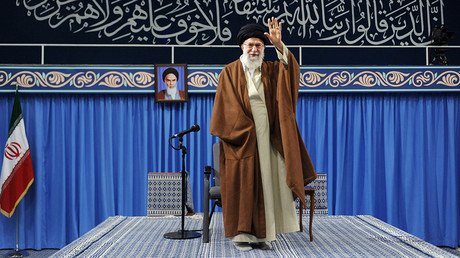NY Times hails ‘Arab Spring’ in Saudi Arabia, world goes ‘Huh?’

A gushing profile of the Saudi Crown Prince Mohammed bin Salman, in which New York Times star columnist Thomas Friedman praises him as the architect of the country’s “Arab Spring,” intent on moderating Islam and fighting corruption, has attracted quite a backlash.
During Friedman’s visit to Riyadh, Mohammed bin Salman – or “M.B.S.” as the journalist invariably calls him – and “several senior ministers” treated him to “different lamb dishes” in the House of Saud’s “ornate adobe-walled family palace” and “wore him out with a fire hose of new ideas about transforming his country” during a conversation that lasted into the early hours of the morning. Importantly for Friedman, “M.B.S.” spoke in English.
While Friedman inserts several caveats into the article, its tone is relentlessly positive, and at one point he says “only a fool would not root” for the Crown Prince’s plans to succeed.
“[T]hey have a young leader who is driving religious and economic reform, who talks the language of high tech, and whose biggest sin may be that he wants to go too fast. Most ministers are now in their 40s — and not 60s. And with the suffocating hand of a puritanical Islam being lifted, it’s giving them a chance to think afresh about their country and their identity as Saudis,” writes Friedman, who reminds the audience of his own early journalistic career as a Middle East correspondent.
Friedman evidently probed “M.B.S.” on several hot-button issues, such as the Saudi-engineered political crisis in Lebanon, the humanitarian cost of the war in Yemen, and Iran. Each time, the Saudi royal, who is thought to have assumed control of the country from his father, King Salman, is allowed to state his views unchallenged. For all his spirit of openness, Mohammed bin Salman refuses to talk about the resignation of Saad Hariri, bats away questions about Yemen by saying that the war against the Houthis is nearly won, and refers to Iran’s supreme leader, Ayatollah Ali Khamenei, as “the new Hitler of the Middle East” without any qualification of that statement from Friedman.
After being roundly criticized in the comments, the 2,700-word profile then immediately went viral, provoking a reaction from high-profile journalists and many of the leading experts on the region.
Anti-terrorism expert Max Abrahms gave a capsule summary of the encounter.
Mohammad Bin Salman: I’m a reformer.Thomas Friedman:You’re the best.Mohammad Bin Salman: I fight Nazis in the form of Iran.Thomas Friedman: You’re a modern day Winston Churchill.Mohammad Bin Salman: I like that.Thomas Friedman:Sure, thanks for the interview.
— Max Abrahms (@MaxAbrahms) 24 November 2017
Indeed, according to AFP's diplomatic correspondent Dave Clark, Riyadh was also pleased with the encounter.
Saudi government just sent me a copy of Friedman's MBS piece, in case I missed it
— Dave Clark (@DaveClark_AFP) 24 November 2017
The Intercept journalist Glenn Greenwald in fact thought that the Saudis couldn't even pay the NYT for such positive coverage.
This Tom Friedman hagiography of the Saudi tyrant who is killing actual reformers & imposing famine and destruction on Yemen is - without hyperbole - utterly disgusting. If the Saudi regime bought a full-page ad in the NYT, it'd be less fawning and shameless than this column: https://t.co/5vHJ1ilWyJ
— Glenn Greenwald (@ggreenwald) 24 November 2017
But according to Shane Bower, of Mother Jones, sometimes paid-for tours that end with lamb dinners in gilded palaces work better than any paid advertising.
Friedman’s Saudi article is a great example of the problem with access journalism. Powerful person brings you into the fold, makes you feel like part of the club, and shows what they want you to see. Then you write nice things about powerful person.
— Shane Bauer (@shane_bauer) 25 November 2017
Adam H. Johnson, who writes for the LA Times, also noted the quality of Friedman's research.
Thomas Friedman hangs out in the Crown Princes palace all day and did a poll. Seems legit. pic.twitter.com/66JllxGMnN
— Adam H. Johnson (@adamjohnsonNYC) 24 November 2017
Journalist Michael Tracey thought the integrity and balance of the New York Times piece should be compared with the alleged ceaseless bias exhibited by RT.
RT could put out 50 full-blown propaganda items a day and never match the sheer insidiousness of this ridiculous, bad-even-by-Tom-Friedman-standards ode https://t.co/AjD6j55UEs
— Michael Tracey (@mtracey) 24 November 2017
But then again, PRI's Richard Hall noted that the "newspaper of record" knows what it's doing.
The NYT's business model is complex and multi-layered, but at its foundation is the vast traffic driven by people hate-reading Thomas Friedman.
— Richard Hall (@_RichardHall) 24 November 2017
While some shared jokes, others, such as AFP's Sarah Hussein and freelancer David Klion, were genuinely offended.
Next time you hear about children starving to death in #Yemen, where Riyadh is waging a war, remember Thomas Friedman tells us that the Saudi crown prince's "biggest sin may be that he wants to go too fast."
— Sara Hussein (@sarahussein) 24 November 2017
There's a lot wrong with that Friedman piece but by far the biggest problem is that we are helping the Saudi king commit genocide in Yemen right now and it really ought to be the biggest story in the world every day.
— David Klion (@DavidKlion) 24 November 2017
The Daily Beast's Paul Gottinger noted that there had already been an Arab Spring in Saudi Arabia, whose details go strangely unmentioned by the New York Times.
The most obscene part of Thomas Friedman’s atrocious piece on Saudi crown prince, is that many who took part in Saudi’s *actual* Arab Spring were executed or have been sentenced to death pic.twitter.com/E6yPNQmVBX
— Paul Gottinger (@PaulGottinger) 25 November 2017
Murtaza Mohammad Hussein of the Intercept thought that the feature was informative and useful, albeit not necessarily in the way Friedman was intending.
Thomas Friedman is obviously terrible but his writing provides a genuine insight into how the global elite thinks about things.
— Murtaza Mohammad Hussain (@MazMHussain) 24 November 2017
But perhaps the most damning response – and the most embarrassing for Friedman – was from Abdullah al-Arian, assistant professor of history at Georgetown University. He simply pulled out a dozen eerily similar rhapsodies from the New York Times over the past century, each time vowing that the new Saudi ruler – however backward he turned out to be in hindsight –would be a reformer who would bring democracy and fairness to the Gulf State. And just like Friedman today, there was always an excitable journalist, convinced that he had received precious insight straight from the horse's mouth, and ready to regurgitate it into the world.
In honor of Thomas Friedman’s latest love letter to Saudi here is 70 years of the NY Times describing #Saudi royals in the language of #reform.
— Abdullah Al-Arian (@anhistorian) 24 November 2017













